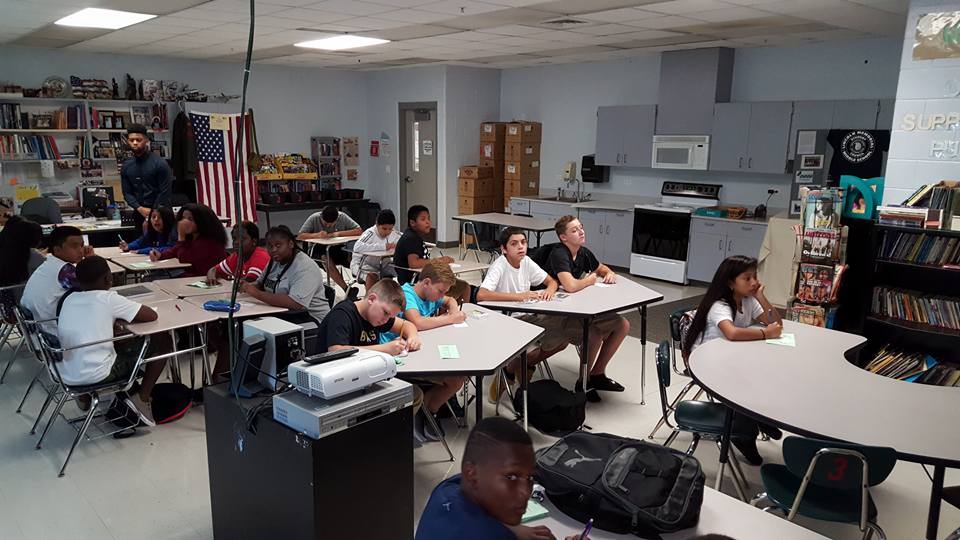
Manatee County School Board members cast a rare vote Tuesday night.
They voted 4-1 to convert one of their district’s middle schools to a charter school.
Only 22 other district-run public schools in Florida have converted to charters.
The effort at Lincoln Middle School won the support of parents and teachers. It also received backing in the broader community.
The local branch leader for the NAACP spoke in support of converting Lincoln Middle School to a charter. The national civil rights organization has recently called for a moratorium on charter schools and passed resolutions pushing to limit their growth.
Rodney Jones, president of the Manatee County NAACP, acknowledged the national organization’s position. But he said his organization believed in the community and its educators.
“For the first time, we are experiencing a true generation gap,” he said. “We are seeing kids go astray. They should be allowed the opportunity to give the child the best opportunity of success that they can possibly have. They will provide a very unique cultural experience for these students that they will not get anywhere else.”
Parents and teachers argued the charter will enable the school to better serve its population, which includes large numbers of students who are learning to speak English, while providing more autonomy and accountability. Nearly 70 percent of students perform below grade level. The community rallied around the idea that the school could do better.
There were tense moments, however, in the hour-and-a-half board meeting. The lone vote against the application came from a veteran of Gov. Jeb Bush’s administration who described himself as a school choice advocate. Scott Hopes said he was concerned about the specifics of the Lincoln proposal, which he argued was financially unsound. Other board members said they shared his concerns, but voted in favor of the application.
A parent- and teacher-led fight
Teachers and other supporters packed the board’s meeting room, wearing blue T-shirts with Lincoln’s spartan emblem.Kevin Jackson brought his daughter, Carol, who has already finished eighth grade at Lincoln. She said she is hopeful other students like her younger sister, Sophia, will benefit from the charter school.
“The thing I have noticed the most is the enthusiastic energy I see my dad possessing when he is involved in these conversations” about the charter, Carol said. “It can benefit my community.”
Several current Lincoln students agreed. They told the board a charter would improve the surrounding community, “making the world a better place.”
Lincoln was not always a middle school. It was established in 1948 as Lincoln Memorial High School, a segregated school for black students. When the school integrated in 1969, it became a middle school.
The Title I school now serves roughly 500 students in sixth through eighth grades. About 44 percent of its students are Hispanic. Every student receives free or reduced-price lunch.
Tony Alves, a math teacher at Lincoln, told the board that the charter conversion will help change the perception of Lincoln and Title I schools.
“I am here to make sure my students get the education that they do deserve: a customized education tailored to their specific needs,” he said.
Eddie Hundley, the school’s principal, said the decision would provide the school with more autonomy and flexibility to meet students’ needs.
Fiscal concerns
Superintendent Diana Greene recommended the School Board approve the charter application.
School board members Charlie Kennedy and Gina Messenger spoke overwhelmingly for the conversion.
Hopes, however, said he had misgivings about the budget plan for the charter school. He said the school’s plans for first-year enrollment seemed aggressive. He asked whether the school would have to lay off staff if it attracted fewer students than expected. He said he worried the school did not have other sources of funding that could backstop the per-pupil funding it expected to receive.
“I don’t believe, according to the budget that was presented, that the proposal is fiscally sound,” Hopes said.
Hopes said he is not against charter schools. In fact, he said, all of his own children have attended them. It was the details of the conversion charter’s plan that concerned him.
“I believe I have a responsibility in this office to use my education and my insight to do whatever I can to ensure the success of our students,” he said in an interview.
Board members Dave Miner and John Colon, as well as the superintendent, also expressed concerns about the school’s planned budget.
During the meeting, Colon said: “I want it to be successful. I don’t want to see any teachers laid off or any students not taken care of.”
However, Hundley, the principal, took exception. He noted that unlike startup charter schools, conversion charters receive facilities built and maintained by the school district. That, he said, relieves a major financial burden and “helps us to more than meet the needs of our students.”
Overall, Hundley said he was pleased the board approved the charter.
“It is monumental for a Title I school to come together and have this accomplished,” he said.


